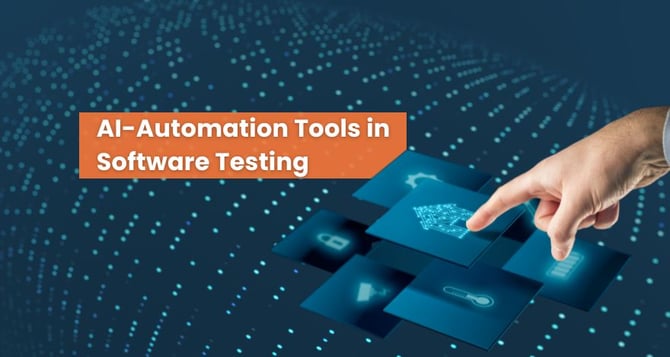AI-Automation Tools in Software Testing and Their Advantages
Explore the game-changing impact of AI tools in software testing, from frameworks like Selenium to AI-powered generators such as Diffblue. Revolutionizing performance testing and defect analysis, these tools bring efficiency, precision, and cost savings.

Several AI technologies and methodologies are being used in software testing to improve efficiency, accuracy, and coverage. These technologies use artificial intelligence and machine learning techniques to automate certain software testing processes.
AI contributes to the creative side of development; it can generate code snippets based on past patterns, providing inspiration and speeding up the creative process. From the early stages of coding to the intricacies of testing and deployment, AI lends a helping hand, automating mundane tasks and offering insights that would take human counterparts significantly more time to uncover.
AI Tools for Software Testing
AI tools have emerged as invaluable companions, revolutionizing the way testing is approached. These tools give the testing process a human-like intelligence because they are equipped with sophisticated algorithms and machine-learning capabilities.
Frameworks for Test Automation
- Selenium: Selenium is a well-liked open-source web browser automation technology. Although it isn't AI-based by nature, it can be combined with AI tools to make testing more intelligent.
- TestComplete: It makes it simpler to maintain tests when the application's user interface changes by using AI for object recognition.
- Applitools: Applitools offers Visual AI testing instruments to verify an application's visual look automatically.
AI-Powered Test Case Generation
- Diffblue: Diffblue saves time writing test cases by using AI to build unit tests for Java programs automatically.
- Randoop: Randoop is a Java unit test generator that generates tests to identify program errors.
Performance Testing
- LoadRunner: Micro Focus's LoadRunner uses artificial intelligence (AI) to mimic actual user behavior, which aids in analyzing system performance under diverse circumstances.
- Apica LoadTest: Apica LoadTest simulates realistic load situations and evaluates API and application performance using artificial intelligence.
Analysis and Prediction of Defects
-
DeepCode: DeepCode helps developers find bugs early by analyzing code using artificial intelligence (AI).
- testRigor: testRigor uses AI in software testing to automatically generate, execute, and maintain test cases across web, mobile, and desktop applications. Its intelligent, no-code approach helps teams reduce maintenance time and improve test coverage with minimal human input.
e.g. Pylint, ESLint. Machine learning algorithms are frequently used by static code analysis tools to find patterns in the code and identify possible problems.
Mobile App Testing
- Appvance: Appvance accelerates the mobile app testing process by using AI to create and run tests on various platforms and devices.
- Test.ai: Test.ai provides web and mobile application AI-driven testing, automatically navigating the application and spotting possible problems.
Benefits of AI-based Testing Tools
Because of their many advantages, AI-based testing tools are becoming increasingly well-liked in the software development and testing sectors.
The following are some of the main benefits of utilizing testing tools with AI:
Quickness and Efficiency
- Automated Test Case Generation: By using AI tools, test cases can be created automatically, which saves a lot of time and effort when it comes to test scripting.
- Faster Execution: AI-driven tests can be completed far more quickly than manual tests, which enables faster feedback on the caliber of the program.
More Comprehensive Test Coverage:
- Exploratory Testing: AI tools can explore applications in ways that humans might miss, which results in more exploratory testing and increased test coverage.
- Handling Big Data Sets: AI can handle massive datasets efficiently, making it possible to test big data applications in-depth.
Enhanced Precision and Accuracy
- Decreased Human Errors: Automation makes it impossible for people to make mistakes when running tests or entering data, which produces more accurate results.
- Testing Consistency: AI systems carry out tests consistently, guaranteeing that the same tests are carried out every time.
Economy of Cost
- Decreased Manual Labor: AI-based testing solutions save money by eliminating the need for labor-intensive manual testing by automating repetitive and time-consuming tasks.
- Early Bug Detection: AI tools stop expensive flaws from entering production by identifying problems early in the development cycle.
Elevating Software Testing with AI: A Paradigm Shift
The integration of AI technologies into software testing has ushered in a new era of efficiency, accuracy, and coverage. The diverse range of AI tools showcased here illustrates the versatility and intelligence these tools bring to the testing landscape.
As the software development and testing sectors increasingly embrace these advancements, the industry stands to gain in terms of speed and efficiency and in the quality and reliability of software products.


%201-1.webp?width=148&height=74&name=our%20work%20(2)%201-1.webp)


.png?width=344&height=101&name=Mask%20group%20(5).png)
















